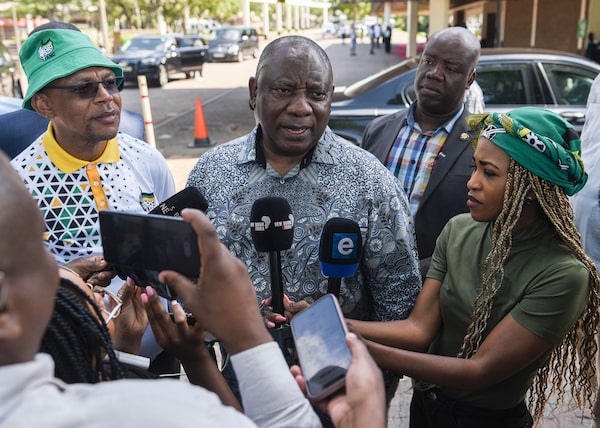
South African President Cyril Ramaphosa speaks to the media after leaving an African National Congress (ANC) National Executive Committee meeting in Johannesburg, on Dec. 4. The meeting was held to discuss the future of Ramaphosa's position as calls continue for his resignation over a scandal over money stolen from his farm.STR/The Associated Press
South African President Cyril Ramaphosa is launching a multipronged defence in the courts and within his ruling party to buy time for his besieged presidency after coming close to resigning last week over a corruption inquiry’s damning report.
Mr. Ramaphosa was on the verge of quitting Thursday and had gone so far as to prepare a resignation speech for a televised address, local media reported, but by Sunday his allies were mobilizing to fight for his survival.
A parliamentary inquiry by three legal experts found preliminary evidence that Mr. Ramaphosa may have violated anti-corruption laws in his handling of a mysterious US$580,000 cash payment from a Sudanese businessman who apparently bought buffalo from his wildlife farm. The money was stashed in a sofa at the farm and then stolen, without a proper police investigation, the inquiry found.
Mr. Ramaphosa’s decision to fight the inquiry in the courts and in parliament, after his allies persuaded him to cancel his resignation plans, will leave South Africa consumed by legal and political battles for months to come. Analysts warn the disputes will distract the government from desperately needed reform decisions at a time of crippling electricity shortages and a stagnant economy.
The inquiry found enough evidence for parliament to set up a committee to consider impeaching Mr. Ramaphosa. But the President cleared the first hurdle in his survival bid Sunday when the top leaders of the ruling African National Congress resolved that the ANC should oppose the inquiry’s conclusions when it is debated in parliament Tuesday.
The issue now moves to a meeting of the ANC’s full national executive on Monday. If the executive agrees, the party can then try to deploy its parliamentary majority to quash the inquiry’s report.
But even if Mr. Ramaphosa wins the executive’s support, another hurdle looms. In the parliamentary vote, ANC dissidents could join opposition parties in pushing for impeachment. Some have already said they will do this.
Meanwhile, Mr. Ramaphosa plans to ask South Africa’s highest court, the Constitutional Court, to review and reject the report of the parliamentary inquiry.
This court challenge may lead to a postponement of the parliamentary vote. But it still leaves Mr. Ramaphosa facing other investigations into the U.S. cash affair, including a police probe and possible investigations by tax and banking authorities. He also faces an ANC leadership conference on Dec. 16.
Many South Africans see the scandal as a product of ANC factional feuding, dating back to an earlier struggle that led to the ousting of former president Jacob Zuma in 2018. A faction loosely affiliated with Mr. Zuma has exploited the cash affair to tarnish Mr. Ramaphosa and try to push him out. This feuding, in turn, could damage the ANC’s chances in the next national election, in 2024. The ANC is already in danger of losing its parliamentary majority, with polls showing its support falling below 50 per cent.
One of Mr. Ramaphosa’s closest friends, ANC veteran James Motlatsi, alleged Friday that a “group of criminals” inside the party was seeking to force the leader’s departure. An ANC spokesperson condemned his comments as “divisive” and “reckless,” but it was a revealing glimpse of the bitter tensions inside the party.
Church leaders voiced alarm at the situation. The conclusions of the parliamentary corruption inquiry are causing “widespread anger and disappointment” among the country’s people, the South African Council of Churches said in a statement.
The Anglican Archbishop of Cape Town, Thabo Makgoba, said the inquiry’s report has sent the country into a crisis. “Our governing party seems to be in meltdown,” he said.
South Africa’s biggest weekly newspaper, the Sunday Times, called for an early election. The U.S. cash scandal has “tarnished whatever was left of the administration’s credibility” and is likely to render the government “ineffective,” it said in an editorial on Sunday.
Some analysts said Mr. Ramaphosa can mobilize enough ANC support to keep the presidency for now – partly because the party fears a worse result in the next election without him – but he will be badly wounded and vulnerable to constant challenges from his opponents.
Until now, his greatest political strength was the perception that he was fighting ANC corruption and cleaning out the criminals in his party. But by going to the courts to challenge the inquiry, he will seem to be borrowing Mr. Zuma’s longstanding strategy of using legal tactics to delay accountability.
“His political and moral standing is gone,” political analyst Sam Mkokeli said in a commentary on Sunday.
“The damage is done. The President behaves like a defence attorney rather than our leader. There is a strong probability he will be the ANC’s last head of state.”
 Geoffrey York
Geoffrey York